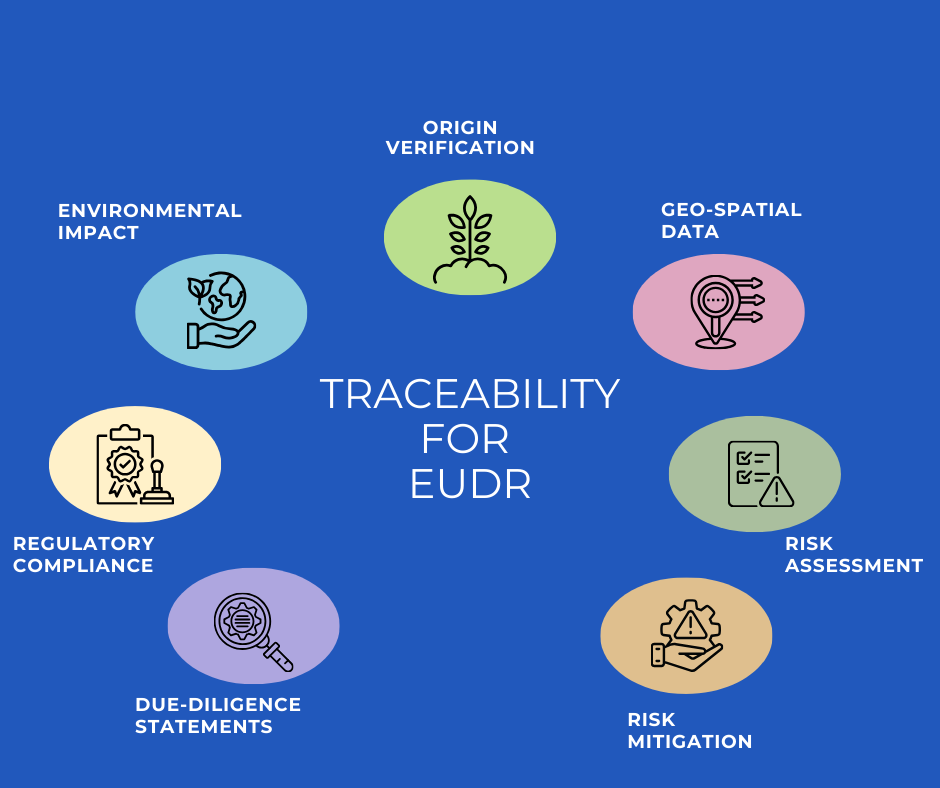Contact: +91 99725 24322 |
Menu
Menu
Quick summary: Explore the EU Deforestation-Free Regulations (EUDR) and gain insights into its significance, compliance requirements, and the pivotal role of traceability solutions in fostering sustainability.

As the world grapples with the devastating impacts of deforestation on climate change, biodiversity, and indigenous communities, the European Union has set its sights on a groundbreaking initiative. The EU Deforestation-Free Regulations (EUDR) aims to take a significant step toward mitigating these challenges.
The new EU Deforestation Regulation (EUDR) will come into force on the 29th of June 2023 and on the 30th of December 2024 businesses will have to comply with all the requirements of the regulation.
This comprehensive set of regulations is designed to combat the drivers of deforestation and forest degradation, both within and outside the EU. The EUDR seeks to address the often-hidden links between the consumption of products in Europe and the deforestation occurring in other parts of the world. By doing so, it strives to eliminate the contribution of EU consumption to global deforestation, setting a new standard for sustainability and ethical trade practices.
As the EU steps up its commitment to combat deforestation, this blog post will delve into the intricacies of the EU Deforestation-Free Regulations. We will explore the key components of these regulations, their potential impact on businesses, and the steps that organizations need to take to ensure compliance. Join us on this journey to understand how the EUDR is reshaping the landscape of responsible sourcing, environmental protection, and the fight against deforestation.
Forests act as carbon sinks, absorbing and storing carbon dioxide, a major greenhouse gas. Their destruction contributes to global warming. Furthermore, forests are vital habitats for diverse species. Deforestation disrupts ecosystems, leading to species extinction. Protecting forests is integral to both climate action and the conservation of Earth’s biodiversity.
Deforestation refers to the deliberate and extensive removal of forests and trees from a specific area, often for agricultural, industrial, or urban development purposes. This practice has severe environmental consequences. It contributes to climate change by releasing stored carbon dioxide, disrupts ecosystems, causes habitat loss and fragmentation, endangers biodiversity, and can lead to soil erosion and altered water cycles. Deforestation is a major driver of global environmental degradation and poses significant threats to the planet’s health.
Deforestation refers to the deliberate and extensive removal of forests and trees from a specific area, often for agricultural, industrial, or urban development purposes. This practice has severe environmental consequences. It contributes to climate change by releasing stored carbon dioxide, disrupts ecosystems, causes habitat loss and fragmentation, endangers biodiversity, and can lead to soil erosion and altered water cycles. Deforestation is a major driver of global environmental degradation and poses significant threats to the planet’s health.
The EU’s new deforestation legislation is part of a broader initiative aimed at tackling the environmental and social consequences of global supply chains. Its primary objective is to prevent European companies from importing goods associated with unlawful deforestation and forest decline. This regulation targets seven commodities: soy, beef, palm oil, wood, cocoa, coffee, and rubber. Several products made from these commodities are also targeted, including leather, chocolate, tires, and furniture.
Under the law, companies are mandated to conduct thorough due diligence assessments on their supply chains, ensuring that imported products adhere to local laws and regulations. Furthermore, companies are expected to evaluate the environmental and social ramifications of their supply chains and take corrective measures to mitigate adverse effects. Additionally, the legislation prohibits the introduction of products into the EU market that are linked to illegal deforestation or forest degradation. Large companies have an 18-month grace period to ensure compliance once the regulation takes effect, after which penalties may be imposed.
The EU is taking action against deforestation to combat environmental and social issues. Deforestation contributes to climate change, threatening global climate goals. It also results in biodiversity loss, undermining ecosystems and wildlife. Additionally, the EU aims to promote sustainable supply chains by addressing deforestation, safeguarding human rights, and ensuring responsible business practices, thus contributing to a more sustainable and ethical global economy.
The EU plays a pivotal role in global anti-deforestation efforts. It employs policies and regulations to promote sustainable trade and ensure imported products are deforestation-free. Through international partnerships, the EU encourages other nations to adopt similar measures. The EU’s commitment to addressing deforestation serves as a model for environmental responsibility, fostering a collective global effort to combat this critical issue.
EUDR compliance involves a rigorous due diligence process for companies to ensure their products are sourced ethically and sustainably, particularly in terms of deforestation. The process includes three key steps:
Data Collection: Companies must gather real-time information about their products, including detailed descriptions, quantities, and geolocation of the origin.
Risk Assessment: Following data collection, a comprehensive risk assessment is undertaken, considering factors such as the presence of forests, land rights conflicts, supply chain complexity, and socio-political aspects.
Risk Mitigation: If risks are identified, companies must implement mitigation measures, which could involve additional data collection, independent surveys, or audits.
The EU Deforestation Regulation significantly impacts businesses involved in importing products associated with deforestation. They are required to establish due diligence systems, assess and mitigate deforestation risks in their supply chains, and report on their efforts. Non-compliance can result in penalties and restricted market access. This places a strong onus on businesses to source responsibly and promote sustainability throughout their supply chains to align with the regulation’s requirements.
Transparency and due diligence are vital in supply chains to ensure responsible sourcing.
They help identify and mitigate environmental, social, and ethical risks, such as deforestation or labor exploitation. Transparent supply chains foster consumer trust and compliance with regulations, like the EU Deforestation Regulation. Businesses that practice due diligence and maintain transparency can protect their reputation, reduce legal liabilities, and contribute to sustainable and ethical trade practices.
The EU Deforestation Regulation holds the potential to bring about significant positive outcomes.
The EU’s Deforestation Regulation can significantly influence global anti-deforestation efforts. Its stringent requirements set a standard for responsible supply chains, encouraging other regions to adopt similar measures. By prioritizing sustainability and transparency, the regulation fosters a collective global push to address deforestation, which is crucial in mitigating climate change and protecting biodiversity. Its impact reaches beyond the EU’s borders, promoting a more conscientious approach to deforestation worldwide.
International cooperation and coordination are essential to address global challenges like climate change and biodiversity loss. Nations must work together to set common goals, share knowledge, and establish agreements that promote environmental conservation and sustainability. Collaborative efforts can lead to more effective policies, resource sharing, and a unified response to issues that transcend borders, ensuring a better chance of success in protecting the planet and its ecosystems.
To ensure compliance with the EU Deforestation Regulation, businesses should:
Traceability plays a crucial role in helping businesses comply with the European Union Deforestation Regulations (EUDR).

TraceX traceability solutions simplify the process of EUDR compliance by collecting and managing the necessary data, conducting risk assessments, facilitating risk mitigation, and ensuring full traceability of products throughout the supply chain. This comprehensive solution helps companies meet EUDR’s requirements for due diligence, compliance, and transparency effectively.
TraceX allows businesses to collect and store detailed information about the commodities they want to sell, including the origin, quantity, supplier, and country of production. It also captures the essential geographic coordinates of the plots of land where these commodities are produced, a key requirement under EUDR. This information forms the basis for traceability.
TraceX enables real-time monitoring of supply chains, ensuring that products’ journeys are continuously tracked from source to market. Any anomalies or risks are immediately detected, allowing for swift corrective actions, as demanded by EUDR.
The use of TraceX blockchain traceability ensures transparency within the supply chain. Various stakeholders can access and verify data related to product origins and compliance with local laws and regulations, providing the transparency sought by EUDR.
In conclusion, addressing deforestation and promoting sustainability are pivotal in the global effort to combat climate change and protect biodiversity. The EU’s Deforestation Regulation is a significant step toward these goals, offering a model for responsible supply chain management. Achieving a balance between environmental goals and economic interests is essential, and international cooperation is paramount. Both businesses and consumers have a role to play in fostering a more sustainable and eco-conscious world.
